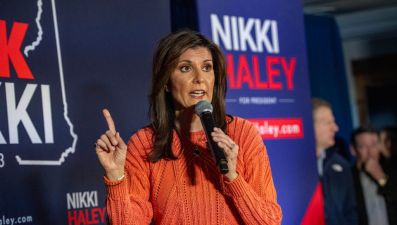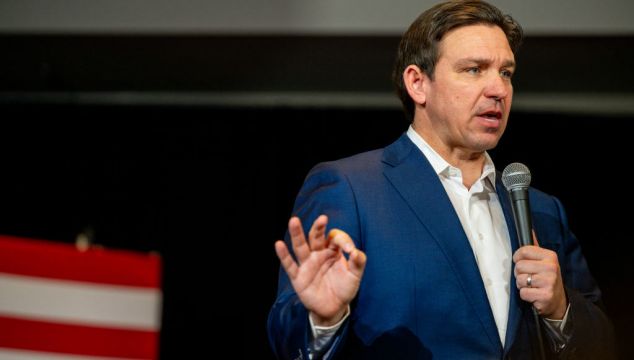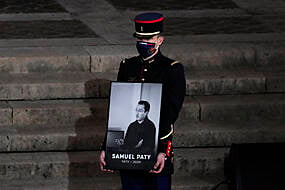Republican presidential candidate Ron DeSantis dropped out of his party's presidential nominating race on Sunday. Here are some of the missteps made by the Florida governor and his campaign.
Faulty strategy, burned through cash
Mr DeSantis began 2023 looking like a viable alternative to Republican former president Donald Trump. But he never successfully articulated to most Trump supporters why he was a better option, while Republicans looking to ditch the former president split their votes among multiple candidates.
His campaign was also beset by internal strife. He had several staff shakeups. The campaign also overhired, burning through cash at a rapid rate, and then outsourced much of the traditional work of a campaign to an outside super PAC, which was often at loggerheads with Mr DeSantis' campaign staff.
Waited too long
The governor waited too long to enter the race, which left him open to blistering attacks by Mr Trump, who had announced his campaign more than six months earlier. Allies, advisers and people close to the campaign now concede that Mr DeSantis' reluctance in the weeks before announcing his candidacy to engage with Mr Trump - including on a Japan trip in April 2023 when he said, "I'm not a candidate" - was one of several costly strategic errors.
Twitter launch blunder
In May, when Mr DeSantis finally announced his presidential bid it was in an online forum on Twitter, now known as X, hosted by its billionaire owner Elon Musk. It was one of the most catastrophic campaign launches in modern US political history.
For nearly 25 glitch-filled minutes, the audio-only feed failed time and again, overshadowing Mr DeSantis' big announcement and undermining his attempt to gain ground on Mr Trump.
Political analysts said it was a rookie mistake to hold a major event over which Mr DeSantis had no control. He ended his campaign on X as he started it - with a blunder. When he announced he was dropping out of the race, he used a fake quote from former British prime minister Winston Churchill.
Bet all on Iowa
Mr DeSantis bet all on winning the first nominating state of Iowa, a gamble that failed badly. He finished a distant second to Mr Trump in the Iowa caucuses on January 15th, a poor result that essentially ended his bid.
Despite pouring much of his campaign's time and resources into Iowa, including campaigning in all 99 counties in the Midwestern farm state, Mr DeSantis finished almost 30 percentage points behind Trump, and he barely beat former US ambassador to the United Nations Nikki Haley for second place. He also lost all 99 counties.
Ukraine war a 'territorial dispute'
In March, even before he had officially launched his campaign, Mr DeSantis called Russia's invasion of Ukraine a "territorial dispute" and claimed the war was not a "vital" US interest.
While those comments reflect the thinking of part of the Republican base, the blowback from several rival candidates and Republican leaders was so strong that Mr DeSantis was forced to walk back those comments a few days later.
It was the first real sign, after Mr DeSantis appeared as a formidable challenger to Mr Trump at the beginning of the year, that he was not as sure-footed a candidate as many had believed.
Abortion ban, teaching of slavery turns off donors
Mr DeSantis signed a series of laws in Florida he believed would burnish his credentials with the right-wing Republican base. That included an April law banning abortions after six weeks and a new series of teaching standards unveiled in July that tells the state's public school pupils that Black people benefited from slavery because it taught them useful skills.
In August, Robert Bigelow, Mr DeSantis' biggest donor, told Reuters he will not donate more money unless Mr DeSantis moderates his policy positions. Mr Bigelow said the Florida abortion ban was his motivating factor.
Mr DeSantis also received wide condemnation for the slavery provision in Florida's new teaching curriculum. Tim Scott, a fellow Republican White House rival who is Black, decried Florida's new standards, describing slavery as "devastating" for Black families.
Extreme videos that even some Republicans could not stomach
In June and July, the DeSantis campaign shared videos that were condemned as anti-gay rights and racist, even by some fellow Republicans.
The first ad came at the end of June's Pride Month, when his campaign shared a video highlighting some of Mr Trump's past statements supporting gay rights.

The video featured a montage of muscle-bound men, bolts of electricity flying from Mr DeSantis' eyes, and an image of actor Christian Bale in the movie 'American Psycho,' in which he plays a serial killer.
In July, the DeSantis campaign fired a staffer who had shared a pro-DeSantis video that featured him at the centre of a Sonnenrad, a symbol appropriated by the Nazis in 1930s Germany and still used by white supremacists.
An awkward campaign style on the trail
Mr DeSantis has long had a reputation as being a poor politician when in more intimate settings with voters. On the campaign trail, some of Mr DeSantis' off-the-cuff comments have come off as strange or dissonant.
Last year he vowed to start "slitting throats" inside the federal bureaucracy if he becomes president. Asked if he had watched Mr Trump on August 3rd being arraigned for a third time this year on criminal charges, Mr DeSantis said he had been too busy overseeing an execution in Florida.







